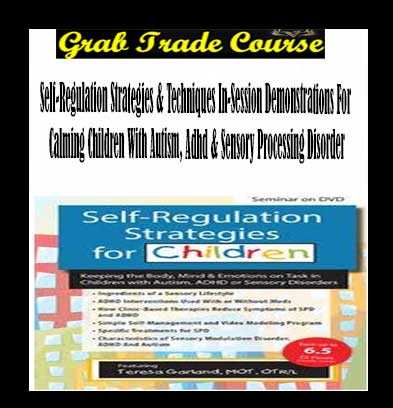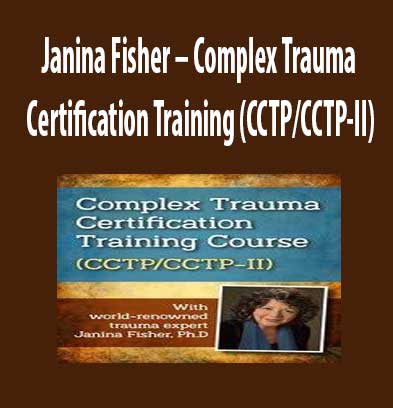Self-Regulation Strategies & Techniques In-Session Demonstrations For Calming Children With Autism, Adhd & Sensory Processing Disorder
Description
Self-Regulation Strategies & Techniques In-Session Demonstrations For Calming Children With Autism Adhd & Sensory Processing Disorder, Self-Regulation Strategies & Techniques In-Session Demonstrations For Calming Children With Autism Adhd & Sensory Processing Disorder download, Self-Regulation Strategies & Techniques In-Session Demonstrations For Calming Children With Autism Adhd & Sensory Processing Disorder review
Self-Regulation Strategies & Techniques In-Session Demonstrations For Calming Children With Autism, Adhd & Sensory Processing Disorder
- DSM-5® updates for autism and sensory modulation
- Build and enhance self-regulation in any setting
- Come away with:
- Sensory therapy techniques
- Self-management and video modeling programs
- Sensory lifestyle
- First person stories
- Energy regulation techniques
Children who have trouble self-regulating throughout the day are missing out on typical childhood experiences in school, on the playground and with their families. This workshop looks at the underlying factors of poor self-regulation and how they affect the child.
Experienced presenter, Teresa Garland, MOT, OTR/l will teach you practical interventions and how to create simple, but effective programs in clinical, school and home settings:
- Sensory therapy techniques
- Simple self-management and video modeling programs
- Sensory lifestyle
- First person stories
- Energy regulation techniques
- Emotional regulation techniques
- Communication methods
- Transition strategies
- Behavioral strategies
Clinical programs such as Interactive Metronome® and Emotional Freedom Technique (EFT™) will be discussed, as will timely topics such as medication vs. non-medication for ADHD and new insights from research into biomedical aspects of autism. You will receive written handouts and a list of resources.
- Summarize characteristics of sensory modulation disorder, ADHD and autism and how they overlap.
- Illustrate specific treatments for SPD that can be duplicated at school or home.
- Describe the ingredients of a sensory lifestyle.
- Tell examples of elements of successful first person stories and transitional activities.
- Describe ADHD interventions to be used with or without meds.
- Apply a simple self-management and video modeling program.
- Describe how clinic-based therapies can reduce symptoms of SPD and ADHD.
How Self-Regulation Affects a Child’s Physical, Mental and Emotional Wellbeing
- Overlay of systems
- Overlap with sensory modulation disorder, ADHD, autism, giftedness, anxiety and related conditions
Sensory Processing Disorder (SPD)
- Vestibular, proprioceptive, and sensory modulation characteristics
- Strategies for home and school
- Making it right: case studies and videos
- Sensory diet vs. a sensory lifestyle
- The big therapies: Interactive Metronome® (IM), brushing and sensory diets
ADHD Strategies
- Parker’s guidelines for giving meds
- Greenspan’s strategies for avoiding meds
- Cognitive strategies, attention strategies and mindfulness meditation
Self-Management
- As a powerful behavior program for ADHD
- Case study on breaking “stimming” habits
Utilizing Video
- Role play & video modeling
- Teaching functional skills
- Catching child “being good”
- Working with emotions
- Art and music
- Emotional Freedom Technique (EFT)
- Polyvagal Theory and autism
iPad® Apps
- Visual schedules
- Social stories
- Visual timers
Autism Strategies
- Communication strategies that provide control
- Match-and-repeat technique for social engagement
- Dealing with picky eating and poor sleep habits
- Behavioral strategies for eliminating difficult behavior
First Person Stories & Strategies for Smooth Transitions
- Discuss social interactions
- Describe relevant social cues and behaviors
- Examples of transitional activities
Other Approaches
- Alternative therapy
- Qi massage
Calming Strategies
- Music, Me-Moves™
- Deep pressure, Ease™
-
Our Policies
A. Product Quality
We will provide GOOD quality of courses fast. If any issue, email: [email protected].
We sure that your problem will be support as soon as possible.B. Digital Shipping Proceess
After your payment, we will review your payment, Then, we will send you PCLOUD LINK OF COURSES through email in 3 – 8 hours. If any issue, we will inform you as soon as possible.








